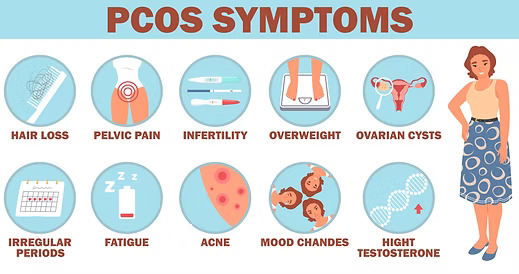
PCOS-related Infertility
PCOS and Fertility: Understanding Your Body and Your
Options
Polycystic Ovary Syndrome (PCOS) is one of the most common
hormonal disorders affecting women of reproductive age, and a leading cause of
infertility. If you have been diagnosed with PCOS, you may feel overwhelmed,
but it’s important to know that you are not alone. With the right information
and specialized care, a diagnosis of PCOS does not have to prevent you from
building the family you desire.
This page is designed to help you understand PCOS and the
many effective treatment options available to help you achieve a healthy
pregnancy.
What is PCOS?
PCOS is a complex endocrine condition that affects how a
woman’s ovaries function. The name can be misleading—it is possible to have
PCOS without having cysts on your ovaries. A diagnosis is typically based on
the presence of at least two of the following three criteria (known as the
Rotterdam Criteria):
- Irregular
or Absent Ovulation: This leads to irregular or absent menstrual
periods, making it difficult to predict or achieve pregnancy. - High
Levels of Androgens (“Male Hormones”): This can cause
physical signs like excess facial or body hair (hirsutism), acne, or
male-pattern hair loss. - Polycystic-Appearing
Ovaries on Ultrasound: The ovaries may be enlarged and contain
many small, fluid-filled follicles that surround the eggs. These are not
true cysts, but immature follicles that have not developed properly due to
the hormonal imbalance.
How Does PCOS Affect Fertility?
The primary challenge for women with PCOS who are trying to
conceive is anovulation—the lack of regular, monthly ovulation.
Without the release of an egg, pregnancy cannot occur naturally. This happens
because the hormonal imbalances in PCOS prevent the follicles in the ovaries
from maturing and releasing an egg.
Taking Control: Managing PCOS for Fertility Success
The good news is that PCOS is a highly manageable condition.
The journey to pregnancy often begins with foundational lifestyle changes,
which can be powerfully effective.
1. Lifestyle Modifications: The First Line of Treatment
For many women, especially those who are overweight, even a modest weight loss
of 5-10% of body weight can have a dramatic impact. It can help:
- Restore regular ovulation and menstrual cycles.
- Improve the body’s sensitivity to insulin (a key factor in PCOS).
- Balance hormone levels.
A combination of a balanced, low-glycemic diet and regular exercise is the
cornerstone of managing PCOS.
2. Medical Ovulation Induction
When lifestyle changes alone are not enough to restore ovulation, safe and
effective medications can help.
- Letrozole: This oral medication is now often considered the first-line treatment for
inducing ovulation in women with PCOS. It is very effective at stimulating
the ovaries to produce and release mature eggs. - Clomiphene (Clomid): Another oral medication that has been used for decades
to successfully induce ovulation. - Metformin: This medication helps manage insulin resistance, which is common in PCOS. It can help regulate cycles and may be used alongside letrozole or
clomiphene.
These treatments are closely monitored with blood tests and ultrasounds to ensure a safe and effective response.
3. Advanced Fertility Treatments
If ovulation induction with timed intercourse is not successful, or if there
are other fertility factors involved, more advanced options are available.
- Intrauterine Insemination (IUI): Often combined with ovulation induction
medication to increase the chance of sperm meeting the egg. - In Vitro Fertilization (IVF): IVF is a highly successful option for
women with PCOS, particularly when other treatments haven’t worked. It
allows for precise control over the stimulation and retrieval of multiple
eggs. Our lab’s controlled environment helps mitigate the risk of Ovarian
Hyperstimulation Syndrome (OHSS), a concern for some women with PCOS.
Our PCOS-Specialized Approach
Managing PCOS for fertility requires a nuanced and
personalized plan. Our team has extensive experience in caring for women with
PCOS. We understand the unique challenges and are dedicated to:
- Creating
a Personalized Plan: We will work with you to develop a treatment
strategy that addresses your specific symptoms, goals, and overall health. - Prioritizing
Your Safety: We carefully monitor all treatment cycles to ensure
a safe response and minimize risks. - Providing
Comprehensive Support: We can connect you with resources for
nutritional counseling and emotional support, because we believe in
treating the whole person, not just the condition.
A Message of Hope
A PCOS diagnosis can feel challenging, but it is important
to remember that most women with PCOS are able to conceive with appropriate
treatment. The key is to seek care from fertility specialists who understand
the complexities of this condition.
You have the power to take the next step. Contact us
today to schedule a consultation and let us help you on your path to
motherhood.
